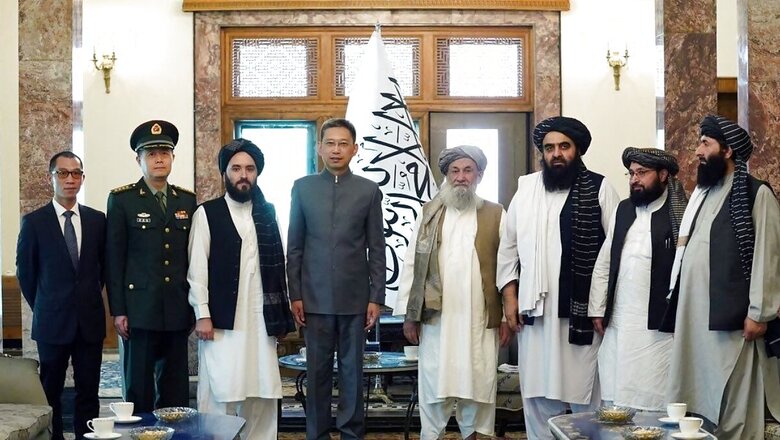
views
China-Taliban relations have taken an interesting turn with the People’s Republic of China (PRC) recently recognising an envoy from Taliban-led Afghanistan in Beijing. In an official ceremony, Bilal Karimi, a former Taliban spokesperson was recognised by Beijing as the official Taliban envoy to Beijing and received his credentials, making China the first country to do so since the Taliban’s takeover of Afghanistan in 2021. However, instead of recognising this as Beijing’s official recognition of the Taliban regime, its foreign ministry spokesperson Wang Wenbin described it as a “normal diplomatic arrangement.” Since the Taliban takeover, no country has given the radical Islamist group’s government a formal recognition.
The Taliban regime has continued with its radical policies that have been reflected in the imposition of new laws on women. The international isolation and non-recognition faced by the Taliban is primarily due to its repeated human rights violations. However, China, even though falling short of official recognition, has been engaging with the Taliban even prior to its takeover of Kabul in August 2021. It is important, therefore, to look into the strategic interests that govern the China-Taliban relations.
During the first Taliban regime (1996-2001), China maintained its relations with the Taliban, although it did not give diplomatic recognition as sought by the Taliban. During this time, China sought assurance from the Taliban that it would not provide Afghan territory as a base for terrorist attacks on China. Despite the official non-recognition, delegations from China visited Kabul and delivered shipments of arms and spare parts to Afghanistan via Pakistan and Chinese telecommunications firms such as Huawei and ZTE. China, for long, kept its distance from Afghan affairs. Though it covertly supported America’s ‘War on Terror’ in Afghanistan, it also increased its engagements with Taliban following the then-US President Barack Obama’s announcement of ending US combat missions in Afghanistan in 2014. This engagement with the Taliban was driven mainly by China’s long-term security concerns related to the ETIM or TIP, which Beijing designates as a terrorist organisation. ETIM, whose aim is to establish an independent (and Islamic) Uyghur state in western China, had set up its base in Afghanistan in 1998, during the Taliban regime.
Notwithstanding the official recognition of the Western-backed transitional administration in Afghanistan that toppled the Taliban regime in 2001, Beijing continued to nurture its ties and increased the intensity of the engagements from 2014 onwards. This was reflected in China’s proactive role in mediation between the former Afghan government and the Taliban. Interestingly, China managed to be a gainer in the mediation by ensuring that it has access to whosoever forms the government. Chinese engagement was extended to peacekeeping efforts between Pakistan and Afghanistan in 2017, as the relations between the two neighbouring countries sharing controversial borders deteriorated. Chinese intervention led to China-Afghanistan-Pakistan, a trilateral dialogue, the same year. Besides the security concerns that emerged with the US’ announcement of its withdrawal in 2014, Beijing’s overt engagement in Afghanistan also emanated from Xi Jinping’s aim to realise his dream of “national rejuvenation” of the Chinese kingdom, whereby China would assume the role of a global power.
Taliban took over Afghanistan in August 2021, overthrowing the civilian government. Since then, the new regime has been struggling to receive official status and global recognition from foreign countries. However, taking into account the Taliban’s radical and brutal history and the unending, especially targeting the women, countries across the world have shown their reluctance in giving their formal recognition to the Taliban. At the time when foreign countries were closing down their diplomatic missions in Kabul following the Taliban takeover, China remained one of the few exceptions (others are Pakistan, Russia and Iran) that continued to keep its diplomatic mission in Afghanistan. In fact, the regime, designated by the United Nations as terrorists, has faced backlash from the international community, involving the freezing of its central bank assets and imposition of international sanctions that have further contributed to the Taliban’s international isolation and Afghanistan’s economic woes.
However, China took a differing position compared to other countries with respect to the Taliban. Just a month prior to the Taliban’s takeover, Beijing’s foreign minister and senior officials met the Taliban in Tianjin, China’s northern city, and described it as “an important military and political force in Afghanistan” whereby it was “expected to play an important role in the country’s peace, reconciliation and reconstruction process.” In this high-profile meeting, Beijing also emphasised the need for the Taliban to ensure that Afghan territory is not used as a base for militants to launch attacks on China, in exchange for China’s offer of economic and investment assistance in Afghanistan’s reconstruction.
Going a step ahead, China was among the first countries to insinuate its openness to the Taliban regime by expressing its desire to deepen “friendly and cooperative” relations with Afghanistan, after the fall of the Afghan civilian government in August 2021. Following the Taliban takeover in 2021, Beijing’s involvement in Afghanistan was mainly in providing humanitarian assistance and Covid-19 vaccines. It also lobbied for the removal of sanctions on Kabul and the unfreezing of its foreign assets by the West. Beijing reiterated its policy of ‘non-interference’, during Foreign Minister Wang Yi’s surprise visit to Afghanistan in March 2022 and expressed China’s position that it “respects the independent choices made by the Afghan people, respects the religious beliefs and national customs of Afghanistan,” and “never interfered in Afghanistan’s internal affairs.” This gave a clear indication of China’s disregard for the rising human rights violations and sufferings of Afghan citizens, within their own country, orchestrated by the Taliban regime.
Chinese engagement with the Taliban regime witnessed a further boost last year through the bilateral exchanges and the agreements reached between the two authoritarian regimes. In January 2023, the Taliban received its first foreign direct investment by signing a 25-year multimillion-dollar oil extraction contract with China, which contains an investment of $150 million per year, that would go up to $540 million over the next three years. In April, Beijing clarified its position on the Taliban regime in Afghanistan which indicated its willingness to do business with the Taliban to enhance its economic and security interests.
Stability in Afghanistan is not only significant for China for ensuring security from separatist attacks but its geostrategic location is extremely significant for Beijing to realise its vision of the ‘String of Pearls’ underlined in its Belt and Road Initiative (BRI) Project. It agreed to extend the China-Pakistan Economic Corridor (CPEC) to Afghanistan in May 2023. Beijing is eyeing Afghanistan’s raw minerals and natural resources and economic rewards for Beijing can be only possible via regional connectivity through BRI and Taliban ensuring security in the border region. Thus, Beijing facilitated the Taliban regime’s involvement in what it considers as BRI’s flagship project.
China became the first country to name its new ambassador to Taliban-led Afghanistan, its new envoy Zhao Xing presenting his credentials at a ceremony in Kabul in September last year. The following month, Beijing invited the Taliban to attend the third BRI forum, attended by 130 countries held in Beijing where discussions were held on the extension of CPEC to Afghanistan and on plans regarding the construction of roads via the Wakhan corridor in the northern part to provide China direct access to Afghan territory.
In future, the Taliban-led Afghanistan would provide support to Beijing to achieve its economic and strategic goals via the BRI project. However, the rest of the world is concerned over such blatant disregard for human rights violations and radical Islam by China. The strengthening of the Taliban regime and its nexus with China have greater implications for regional and global security concerns.
The writer is an author and columnist and has written several books. His X handle is @ArunAnandLive. Views expressed in the above piece are personal and solely that of the author. They do not necessarily reflect News18’s views.

















Comments
0 comment